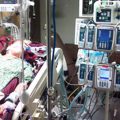Podcast: Play in new window | Download
Subscribe: Apple Podcasts | RSS
Hi, it’s Patrik Hutzel from INTENSIVECAREHOTLINE.COM where we instantly improve the lives for Families of critically ill Patients in Intensive Care, so that you can make informed decisions, have PEACE OF MIND, real power, real control and so that you can influence decision making fast, even if you’re not a doctor or a nurse in Intensive Care!
This is another episode of “YOUR QUESTIONS ANSWERED” and in last week’s episode I answered another question from our readers and the question was
My Mother is in ICU for Post- Cardiac Arrest Care, Is this a lifetime impairment or disability?
You can check out last week’s question by clicking on the link here.
In this week’s episode of “YOUR QUESTIONS ANSWERED” I want to answer questions from one of my clients Stephanie as part of my 1:1 consulting and advocacy service! Stephanie’s mother is in post- cardiac arrest care in the ICU and is asking if the Healthcare team is always NEGATIVE on issues like this.
My Mother is in the ICU For Post-Cardiac Arrest Care. Why Does the ICU Team Pushing Her Towards End of Life?

“You can also check out previous 1:1 consulting and advocacy sessions with me and Stephanie here.”
Stephanie: Hello, Good Morning.
Patrik: Good Morning, Stephanie. How are you?
Stephanie: I’m good. I’m good, Patrik. I just texted Miranda.
Patrik: Right.
Stephanie: Make sure it’s a good time. So, let’s give her a call.
Recommended:
Patrik: Right, well if she’s not-
Stephanie: Unless you have something you want to talk about first? Pardon me?
Patrik: Right. No, no, if she’s not ready yet, we can talk, or I can call you back. It’s up to you.
Stephanie: She has been anxious, but I think we’ve gotta jump in. And the thing is, you don’t know what you don’t know.
Patrik: That’s exactly right.
Stephanie: And that is what I fear-
Patrik: One thing that I also wanted to clarify was, when we spoke on Wednesday, or on Wednesday night your time, you never mentioned that they mentioned end of life. This is new to me. We’ve never spoke about this. I didn’t bring it up, because I would’ve thought that you as family would’ve brought it up, if they had brought it up, because it would be such an important topic.
Stephanie: Yeah. They said, you have a couple of options. If Carmen had wanted to be like this. We wanna make her comfortable, or it seems like Carmen was a vibrant person blah blah blah. I’m like, “Come on, this is too soon. We aren’t even giving her a chance.”
Patrik: Yeah. Yeah. So, that’s because that was never part of the discussion on Wednesday. I was actually surprised when you told me in your message, that end of life has been mentioned.
Stephanie: Mm-hmm.
Patrik: Because to me I can say-
Stephanie: They didn’t end of life, they didn’t call it end of life. They said quality of life.
Patrik: Okay. Okay. But now-
Stephanie: And they mentioned it again on a meeting we had Thursday.
Patrik: Right because now it, to me, reads like … I’m just going through her messages again … like, that now end of life is all of a sudden an option for them. And I am wondering, and I’ll tell you what I’m thinking, and you can correct me if I’m wrong there. But now that they know you will not rush into LTAC, I’m wondering when all of a sudden, they’re painting this doom and gloom picture, and say, well now of a sudden it’s all bad. And because you’re not budging on LTAC, now all of the sudden, end of life is something they wanna discuss.
Stephanie: Mm-hmm. Well, they do know that I’m not interested in that, but with the way that my feeling, also made it seem like they were kinda wanting to accept the one that my niece works at. Did you catch that part?
Patrik: Your niece works at an LTAC?
Stephanie: Right across the street from the hospital, yeah, at Burnham. Yeah. She works at Burnham. She cannot work on the vent unit. She can go up there and check on her, but she can’t work on it because they have to have specialised training. She said it’s really not like a nursing home, she said it’s more like a hospital.
Patrik: Well, I’m not even-
Stephanie: That’s what they say. Again, they didn’t visit it though, we didn’t go there and see it though. So how do we … I don’t know. She works there, and I know she knows what she’s doing. She’s been a tech for a long time.
Patrik: Right, so she’s a tech. What sort of tech, like?
Recommended:
Stephanie: It’s called, it’s like a helper. You know how nurses have these folks that work with them?
Patrik: Oh, like a nursing aide, like a nursing aide or-
Stephanie: Yeah, exactly. Yes, exactly.
Patrik: So she practically works in the facility where they want to send Carmen to, is that right?
Stephanie: That is correct.
Patrik: Oh my goodness. I’m not sure whether that’s a good idea. But here is the thing then, if that’s the case, again, she would then be going from Intensive Care to a facility where they’re using nursing aides. And again, no disrespect to the people, but I know how much training it takes to look after somebody on a ventilator with trach That takes years of training. And that is exactly-
Stephanie: They call it HICU, H-I-C-U.
Patrik: Sure, sure. Do you know what it’s H, high? High?
Stephanie: I think it’s high intensive care, or something like that. Yeah.
Patrik: Yeah. Look, but that can only end up being a euphemism for whatever is needed.
Stephanie: You’re right. You’re right.
Recommended:
Patrik: The reality is that, the ICU wants her out because of bed blocks and money and whatnot, but that’s not what your mother needs. From my experience, it’ll be an absolute disaster if she would go to that hospital. Now if she goes to that hospital, is that … So you’re saying it’s literally across the road. Is that part of that particular hospital?
Stephanie: Yes.
Patrik: Right, so it’s the same organisation.
Stephanie: Exactly.
Patrik: Right. Right. Yeah, but that doesn’t-
Stephanie: It doesn’t make you feel any better.
Patrik: Nah, doesn’t make me feel any better. It makes me feel a little bit better, in terms of that it is across the road, because sometimes people get shipped out to another location. I mean they get literally shipped out, miles away.
Stephanie: Right.
Patrik: So, it does make me feel better from that perspective, but I have-
Stephanie: That’s only if there’s a bed there, only if there’s a bed there, but of course, they wouldn’t accept anything other than that. I wanna know if we can just say no. Can we just say no we don’t wanna … we can get the trach, get the trach and don’t tell them anything yet. We don’t give our trump card, you know? We don’t tell them too soon, exactly what we’re gonna do. So, we’ll get the trach, you have to sign in order to get them to go to the LTAC right?
Patrik: Absolutely. Absolutely. This is what I always say, Stephanie, nobody can force you to do anything. Just because they want her out, doesn’t mean they can force you. There is no law, or I would imagine … Have they brought up the topic of health insurance? Have they brought that up?
Stephanie: Yes, yes, yes.
Recommended:
Patrik: So-
Stephanie: My mother only has Medicaid and Medicare. She has both, the dual insurance. She has the full coverage for Medicaid, but she doesn’t have any other insurance, extra insurance from AARP or any place like that. So, they did bring that up.
Patrik: Right. But I wouldn’t worry about that, because again, it’s a clinical issue, and it’s matter of … As long-
Stephanie: I told them. I told them. I told them, Patrik. I said, “This should not be an issue of insurance.” I said, “This is about Carmen’s care.”
Patrik: Yeah. Have you or Miranda, have you heard from the insurance directly?
Stephanie: No.
Patrik: No. So, then I wouldn’t worry about it. I wouldn’t worry about it. Because if you haven’t heard from the insurance directly, I would not worry about that. If you get a call from the insurance tomorrow, and they say, “Hey, we gotta send Carmen somewhere else,” because she’s running out of entitlement or whatever, that is a whole different scenario.
Right? And certainly, I have seen that too, but that’s usually only down the line. How many days has she been in ICU now, 12 days?
Stephanie: Yes.
Patrik: Very early days.
Stephanie: She’s got at least 100 days.
Patrik: At least. People are in Intensive Care, sometimes for many weeks.
Stephanie: Mm-hmm (affirmative).
Patrik: Right. There is no law in the world that can force you out of Intensive Care. If you as medical power of attorney or Miranda doesn’t-
Recommended:
Stephanie: We are trying to get her … she doesn’t have it yet, that’s what she needs to get right?
Patrik: You mean on a mental level…
Stephanie: Well a piece of paper.
Patrik: Yeah absolutely.
Stephanie: She has to have it notarized right?
Patrik: Yeah, well that or she would have to agree to that, like sign for it. And I would not sign anything.
Stephanie: She’s not.
Patrik: No, and it’s also … have you for example had a look yourself into this LTAC.
Stephanie: No, that’s the least that we were gonna do. We were going to go there. I am thinking of taking a trip there today before we go … she’s having a meeting at six. I told them six because they have a tendency to be late, so hopefully six thirty, if we do it at 6:30. I mean I have to go to service from 12 to 2 and come back and try to fix a salad before I go, fix my little, everybody is bringing a dish, so get that done and go take a look at that place okay?
Patrik: Right, right, I think it is probably worthwhile you looking at the place.
Stephanie: They said that too, they said, “Maybe you can look at it, at some nursing homes over the weekend.”
Patrik: Mmmm, when they say nursing home, why are they saying nursing home?
Stephanie: Because, because, some nursing homes have a “vent unit” they said.
Patrik: But this is not a nursing home…. I mean even … it would be even worse if it was a … I mean LTAC is bad enough, but a nursing home would be I mean-
Stephanie: Surely a disaster. A suicide, it’s like writing out a suicide note.
Patrik: Mmmm.
Stephanie: Well, no, we’re not gonna, I know Miranda’s gonna follow my lead. I know she is.
Recommended:
Patrik: And have you or your family ever been in a similar situation before? Have you ever seen anything like that before?
Stephanie: Yes, my Nana. She moved from nursing home to nursing home to nursing home.
Patrik: Oh my Goodness.
Stephanie: Yeah she had, she had a stroke and we haven’t seen each other. I’m shaking a little bit, I think after having a cup of tea.
Yeah so we took care of her ourselves when she was at home, we still haven’t seen it for ourselves and we couldn’t keep her at anymore. This is what she is going through now she said, she’s like I’ll take over this I don’t want to go through this again. “I couldn’t,” she said, “because no matter how much you’re there, can you get,” … it’s totally … it’s totally … different you know?
It’s like, I can’t face to see them, I don’t wanna see them, have my mother’s body break down and her go into decubitus ulcers and stuff like that. My mother was two years at home, she never broke down at all and her body never broke down.
Patrik: Right, right.
Stephanie: And we had people to come to the house. We’re not in a position to do that this time.
Patrik: Yes, absolutely.
Stephanie: So Miranda is kinda like teetering, whether to watch them, whether to go through this. All I know is my mother looking in my face and she said “I don’t wanna, Miranda, don’t let me suffer.”
Recommended:
Patrik: Absolutely and that is such an important point, because, and I will tell you why it’s an important point. Have I seen patients suffer in Intensive Care? Yes I have. It would be a lie if I told you otherwise. Have I seen patients suffer and survive in Intensive Care? Yes I have. So have I seen patients suffer in Intensive Care and not survive? Yes I have. So I’ve seen the whole spectrum. But, you would have heard some people say “Hey! I would never want to live on machines, I would never want to live on a ventilator.” You would hear people say that or you would have heard people say, “Hey, I don’t wanna be a vegetable and be alive.” Have you heard some like that?
Stephanie: Oh absolutely.
Patrik: Yeah, you would. So the reason I am bringing this up is okay, I hear people say this all the time. Now I do believe that those terms are overused. And I do believe it doesn’t reflect on the snapshot that people get when their loved ones are in ICU. It looks horrible and you think she’s suffering, she probably is. But number one, she won’t remember much of it, and number two if she is suffering now to get out of Intensive Care alive I would imagine that’s what she would have wanted.
Stephanie: Right, it’s like is a little bit of suffering, okay to have your whole life.
Patrik: That’s right-
Stephanie: We didn’t call Miranda yet.
Patrik: Do you want me to dial her in?
Stephanie: Not yet.
Patrik: Not yet, okay okay, so this is … I hear it all the time, my mum told me I would never want to live on a ventilator. Well, that’s not the goal. That’s not her goal.
Stephanie: And that’s what she’s really, really, really, struggling with. I’ll be straight with you. On the other hand, she’s not oblivious to the fact that so many people, and she’s heard so many stories of people coming through and them being just fine. And making it out. And she read about the brainstorm, she said, “I’ve read about it.” She’s very astute if you will, because she’s not going taking anything. She’s the one who told me about you Patrik.
Patrik: Right, right.
Recommended:
Stephanie: She was the one who looked at us and said, “I saw this guy, I’m kinda interested in what he has to say.” You know?
Patrik: Right, right.
Stephanie: She was like we can’t afford that, and I said we can, we can’t afford to lose Carmen either.
Patrik: Right, right.
Stephanie: So that’s why I was kinda teetering, because if she was going to decide to just let Mom go, then it didn’t make any sense to hire you. You know what I mean?
Patrik: Right, right, I hear you, I hear you. You see this is the other thing is, if Miranda is working in that hospital, she would have seen people die as well and she would have seen people suffer as well. I would imagine and that-
Stephanie: I mean her Grandmother, her grandmother. Yeah.
Patrik: Right, but she would have been at a different age.
Stephanie: My Nana was eighty- four.
Patrik: So Carmen is 54 so-
Stephanie: 64 six four, you said 64?
Patrik: Not five four isn’t it?
Stephanie: Six four, no she’s 64.
Patrik: Right but even so-
Stephanie: She’s still young.
Recommended:
Patrik: It’s way too young. And it’s really, the other thing, I can’t remember if I told you that on Wednesday, 90-93% of patients leave Intensive Care alive. That’s nine patients out of ten.
Stephanie: She needs to hear that.
Patrik: She does, and now that they are mentioning end of life, now that this has been thrown in the mix I almost believe that it’s a strategy from them, because they realise you’re not budging on LTAC but you want the tracheostomy, but now they can see that they can’t empty their ICU bed as quickly as they would like. So now they throw in end of life because it’s another one-
Right? Right, and that’s another way to manage their beds.
Stephanie: Yes.
Patrik: They’re pushing hard with LTAC and they’re pushing hard with end of life now because they’re realising uh-oh we can’t run our default strategy here.
Stephanie: Right. So she’s… Carmen’s body is like swollen, but I think it’s from the neuro trauma. It affects, you know the brain is in charge of everything, so when the brain goes into a storm like that, that’s the body’s way … the brain’s way of trying to heal itself.
Patrik: Yes.
Stephanie: Is that true?
Patrik: Yes, very much so. Somebody with a head or brain injury. I can tell you what they need most of all, they need time. Is there any guarantee that people recover 100%, no of course there isn’t, we have no crystal ball. We have no crystal ball.
Stephanie: Right. And they say she’s in the middle. And I didn’t appreciate the fact that, the neuro surgeon, she’s not even a surgeon, she’s an Intensive neurologist. I was not happy with the fact that she didn’t give us on a scale where Carmen is. She tried to say she didn’t have any numbers. When I said the Glasgow scale she said … I think I mentioned that … she said at this point she’s about a three. I said of course when she’s on sedation. She said she’s not had sedation. So she still didn’t give us the report, you know what I’m saying?
Patrik: Yeah, yeah-
Recommended:
Stephanie: Shouldn’t we have physical copy of a report? But no.
Patrik: Well not necessarily, if it comes to the point where … at the moment it’s all about getting the trach done and keeping her in the right environment. And that’s what it’s all about at the moment. I wouldn’t go too far…
Stephanie: That’s it.
Patrik: That’s it. Just so that I understand this. Did you say that they’re saying she has a Glasgow Coma scale of three is that what you said?
Stephanie: That’s what she tried to say. She said she’s on the lower end.
Patrik: Right, and that’s a neurologist?
Stephanie: Yeah.
Patrik: Right, and who are the driving forces at the moment? Who is making all that noise? Is it the Intensive Care doctor, is it the neurologist? Who is it? Who’s driving all of this?
Stephanie: Two people, the Intensive Care doctor because when we had to leave him she was the only one, the ONLY one who spoke because she knows … they know … they probably have tapped into how we feel … they tried to attack from the thing that we don’t know where she is, that she falls in that middle. She says we know she’s not brain dead we can’t say there’s a certain set of you know whatever directly that she has and so that she’s gonna wake up. She said she’s in a grey area, she’s in the middle, we don’t know. That’s what they’re saying.
Patrik: And that’s probably accurate that they don’t know. They need to give her more time.
Recommended:
Stephanie: Oh, they not trying to give her no more time honey.
They trying to get her off this thing and get her in the LTAC if that’s what we wanna do. They see that we’re moving towards not giving up, they see that.
Patrik: Right, okay.
Stephanie: And then there’s the senior ICU doctor, so he’s a consultant too. And I thought no, he’s coming in, he’s pushing for us to … If this was my mother blah blah blah … I would not … I could tell you … I signed up for this to take care of people … I sincerely want to take care of people. He tried to convince us that he cares about Carmen.
Patrik: So, here is and I can’t remember, maybe I am repeating myself, I can’t remember if I mentioned that on Wednesday.
The 1:1 consulting session will continue in next week’s episode.
How can you become the best advocate for your critically ill loved one, make informed decisions, get peace of mind, control, power and influence quickly, whilst your loved one is critically ill in Intensive Care?
You get to that all important feeling of making informed decisions, get PEACE OF MIND, CONTROL, POWER AND INFLUENCE when you download your FREE “INSTANT IMPACT” report NOW by entering your email below!
In Your FREE “INSTANT IMPACT” report you’ll learn quickly how to make informed decisions, get PEACE OF MIND, real power and real control and how you can influence decision making fast, whilst your loved one is critically ill in Intensive Care! Your FREE “INSTANT IMPACT” Report gives you in-depth insight that you must know whilst your loved one is critically ill or is even dying in Intensive Care!
Sign up and download your FREE “INSTANT IMPACT” REPORT now by entering your email below! In your FREE “INSTANT IMPACT” REPORT you’ll learn how to speak the “secret” Intensive Care language so that the doctors and the nurses know straight away that you are an insider and that you know and understand what’s really happening in Intensive Care! In your FREE report you’ll also discover
- How to ask the doctors and the nurses the right questions
- Discover the many competing interests in Intensive Care and how your critically ill loved one’s treatment may depend on those competing interests
- How to eliminate fear, frustration, stress, struggle and vulnerability even if your loved one is dying
- 5 mind blowing tips & strategies helping you to get on the right path to making informed decisions, get PEACE OF MIND, control, power and influence in your situation
- You’ll get real world examples that you can easily adapt to you and your critically ill loved one’s situation
- How to stop being intimidated by the Intensive Care team and how you will be seen as equals
- You’ll get crucial ‘behind the scenes’ insight so that you know and understand what is really happening in Intensive Care
- How you need to manage doctors and nurses in Intensive Care (it’s not what you think)
Thank you for tuning into this week’s YOUR QUESTIONS ANSWERED episode and I’ll see you again in another update next week!
Make sure you also check out our “blog” section for more tips and strategies or send me an email to [email protected] with your questions!
Also, have a look at our membership site INTENSIVECARESUPPORT.ORG for families of critically ill Patients in Intensive Care here.
Or you can call us! Find phone numbers on our contact tab.
Also check out our Ebook section where you get more Ebooks, Videos and Audio recordings and where you can also get 1:1 counselling/consulting with me via Skype, over the phone or via email by clicking on the products tab!
This is Patrik Hutzel from INTENSIVECAREHOTLINE.COM and I’ll see you again next week with another update!







